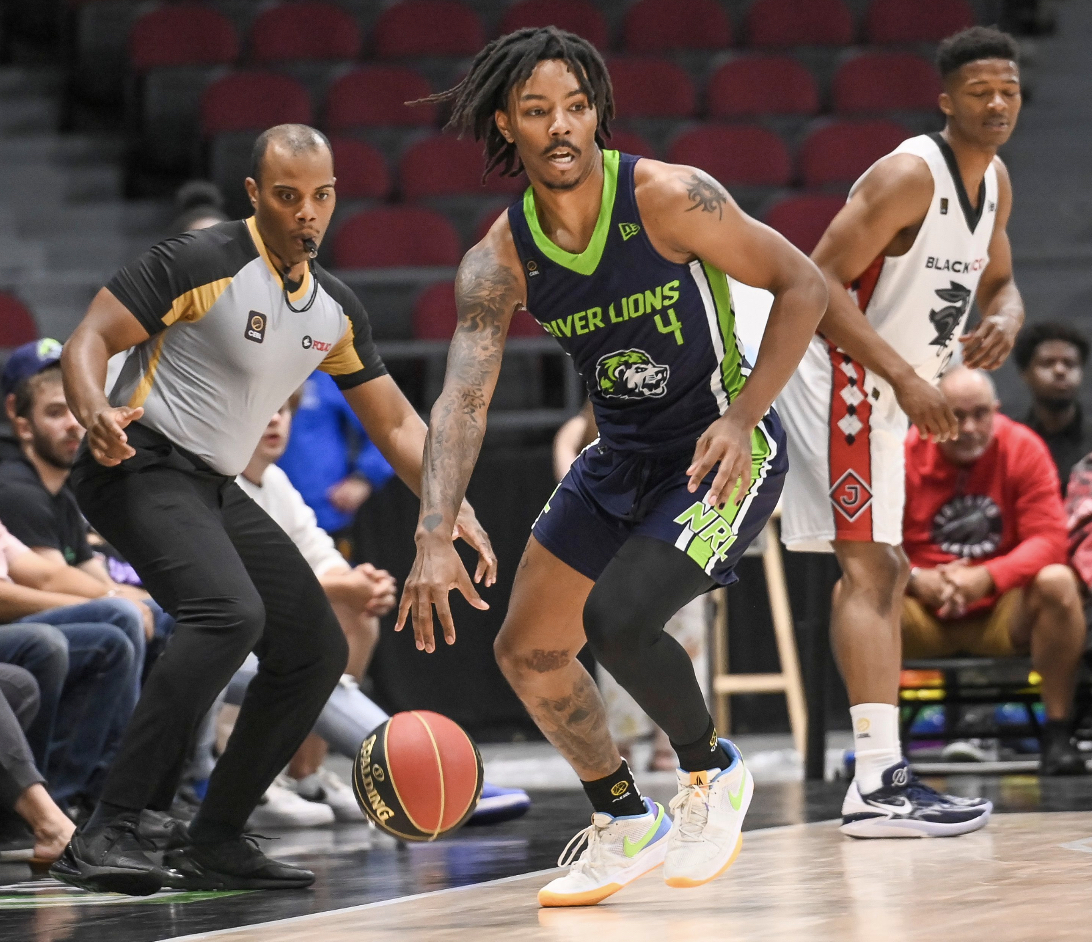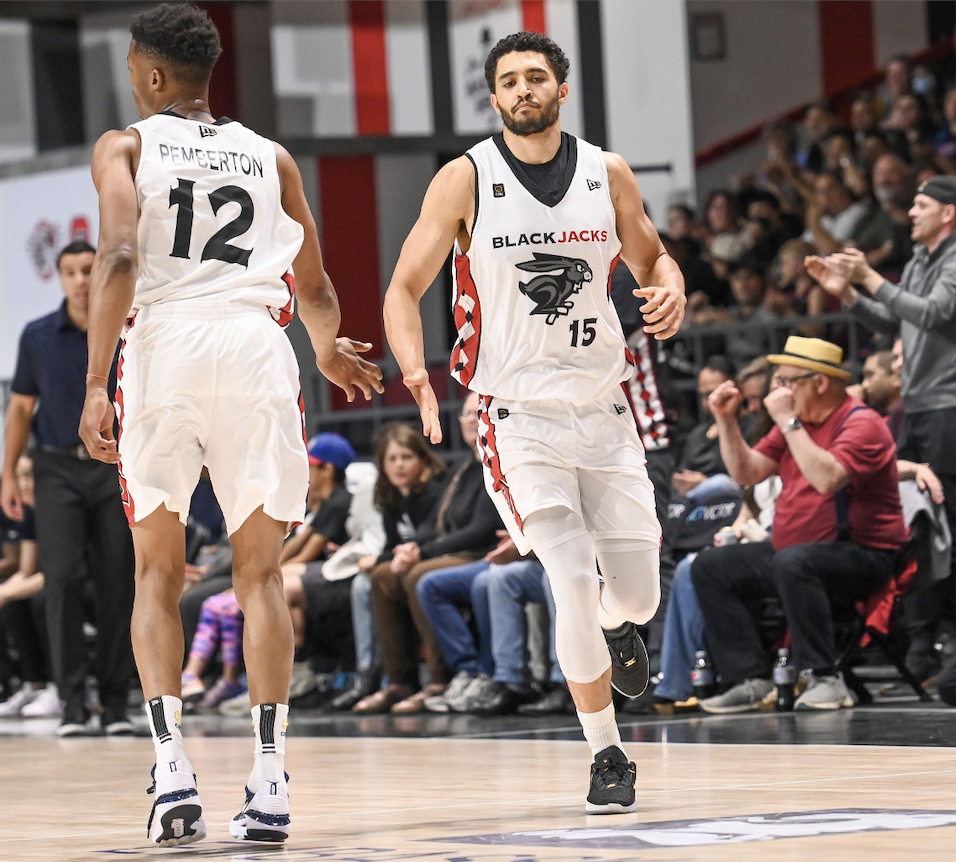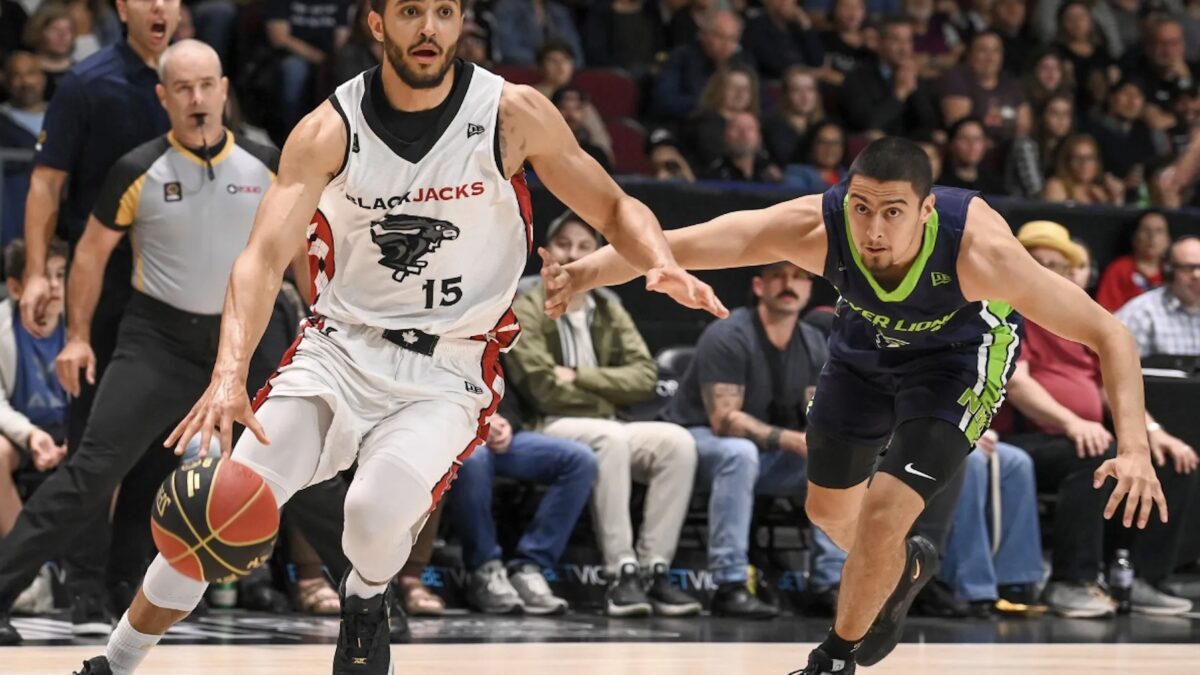The Ottawa BlackJacks competed with grit until the final buzzer, but were unable to maintain their perfect 3-0 home record in the Canadian Elite Basketball League after losing 93-82 against the Niagara River Lions on Saturday, June 17.
Another loss on the road three days later — an 85-83 cliffhanger against the Scarborough Shooting Stars — dropped the BlackJacks to 4-4 on the season. Ottawa is now tied for second place in the CEBL’s Eastern Division, along with the River Lions and Shooting Stars (both 4-4), ahead of a home game tonight (June 22) at TD Place against the fifth-place Montreal Alliance (3-6).
The Brampton Honey Badgers are currently first in the East with a 5-4 record.
In Saturday’s game, River Lions point guard Khalil Ahmad led the way offensively and defensively against the BlackJacks with 19 points, eight assists and six steals. BlackJacks forward Jackson Rowe had a team-leading 19 points for Ottawa, along with six of the 10 steals the BlackJacks notched.
It was a full team effort from Niagara, who had five players score over 10 points; Ahmad, Jahvon Henry-Blair and Antonio Davis Jr. scored 19, 18 and 17 points respectively. Edward Ekiyor and Patrick Whelan each had 12 points, combining for 24 of Niagara’s 31 points from non-starters.
Ekiyor registered another efficient double digit scoring night, scoring 12 points on a 55-per-cent shooting rate from the field while adding six rebounds and four assists.
In a post-game interview, River Lions head coach Victor Raso praised Ekiyor’s attitude and style of play.

“He’s one of the best teammates. He never complains about getting subbed, never complains about not getting the ball,” Raso said. “For your best teammate to be 6’10, athletic, talented and insanely competitive, I’m just lucky to have him on the team.”
Raso said the team’s depth has been key to its success.
“Last game Lloyd Pandi was amazing. Tonight wasn’t his greatest game [but other guys] stepped up and that’s kind of the way this team has been all season.”
He added that Ahmad’s excellent shooting and playmaking forces opponents to double-team him, creating space for teammates to get open looks and easy buckets. When that happens, they’re tough to defend.
Despite the loss, BlackJacks head coach James Derouin thought the effort was there.
“We were crashing the glass, we were creating some turnovers and attacking in transition. I thought we were diving on some balls, but unfortunately, we couldn’t capitalize,” said Derouin, adding that turnovers, their struggles to shoot threes and missed free-throws were the main reasons why Ottawa lost.
‘We were crashing the glass, we were creating some turnovers and attacking in transition. I thought we were diving on some balls, but unfortunately, we couldn’t capitalize.’
— James Derouin, Ottawa BlackJacks head coach
BlackJacks guard Kadre Grey has been a monumental part of the BlackJacks’ success this season. He ranks 5th in Canadian Elite Basketball League averaging 19.3 points per game, second in the CEBL with 7.0 assists per game and is shooting 49.4% from the field, which ranks 5th best in the league.
The River Lions did their homework and contained Grey, limiting him to six points and only three field goal attempts, but his teammates stepped up.
Four BlackJacks scored in double digits. Rowe led the way with 19 points, seven rebounds and five assists; forward Deng Adel had 14 points, eight rebounds and nine assists; and forward Tommy Scrubb scored 12 in his first game this season on 50 per cent shooting from the field.
Forward Zena Edosomwan scored 13 of Ottawa’s 25 bench points, sinking an impressive 71 per cent of his shots.
Derouin said having a range of players who can score is key to the team’s strategy.
“What we’re preaching here is we want five, six guys in double figures and we feel like we have the talent on our team to do that,” Derouin said. “If we’re going to be successful offensively, it has to come from multiple sources.”
The BlackJacks started the game well and played with high intensity, moving the ball efficiently and successfully driving the rim to build an early lead.
Rowe was making his presence felt early and often in the paint and from beyond the arc, scoring 10 of Ottawa’s 12 points halfway through the first quarter. He made the River Lions defence pay for giving him open space and used his superior spatial awareness to repeatedly find open teammates and dissect the defence with his crisp passes.
The teams exchanged buckets and defensive stops as the River Lions held a slight 21-19 advantage after the first quarter.

The BlackJacks continued to find their rhythm in the paint in the second quarter. Ottawa’s guards spread the floor with their elevated shooting threat and forced defenders to challenge them to try to stop high-percentage shots. This routinely left a Blackjack forward unguarded in the paint for an easy layup or short jumper.
However, the River Lions still outscored the BlackJacks 48-38 in the paint, mainly due to a defensive adjustment in the second half in which an extra defender stayed low and made it tougher for Ottawa to get good looks close to the hoop.
But what really hurt the BlackJacks was turnovers; they had 18 compared to the River Lions’ 11. Niagara also had 13 steals — resulting in several easy buckets in transition against an unset BlackJacks defence. In contrast, the BlackJacks had only four.
‘What we’re preaching here is we want five, six guys in double figures and we feel like we have the talent on our team to do that. If we’re going to be successful offensively, it has to come from multiple sources.’
— James Derouin, Ottawa BlackJacks head coach
The River Lions had 18 points off of turnovers and 20 fast break points; the BlackJacks had only 14 points off turnovers and 15 fast-break points, which proved to be the difference.
According to Derouin, it was a good defensive performance minus the turnovers.
“The turnovers have plagued us a little bit throughout the season — points off of turnovers specifically,” Derouin said post-game, adding that ball security has emerged as an issue after Niagara’s guards knocked the ball out of BlackJacks’ hands several times.
“Against a team that good, you’re not going to get away with it.”
The River Lions are the second best three-point shooting team in the league and they showed it, nailing 34 per cent from beyond the arc, compared to 25 per cent for Ottawa. The BlackJacks took an early second quarter lead and maintained it until a late run from Niagara powered by three-pointers gave them momentum.
The 9-2 run on a trio of three-pointers gave the River Lions a 45-42 halftime lead.
Niagara continued its momentum into the second half. Their defence was fierce and physical; 13 of Niagara’s 23 third quarter points came in transition or off of turnovers. The River Lions were able to frequently double-team the opposing ball carrier, causing him to make an errant pass or turn the ball over for many transition points. Niagara’s agility, awareness and speed on defence allowed them to get off their screens quickly and close down Ottawa’s shooting lanes.
Ahmad said Niagara’s strong defence in the third quarter was pivotal. “The change always comes on defence … If we’re locked in on defence, that’s when we start making plays and getting easy buckets on offence.”
“In the third quarter,” said Raso, “we started to finish possessions on defence and then when we go (in transition) — that’s when we’re at our best.”
Five turnovers by the BlackJacks early in the fourth quarter opened Niagara’s gap to 19 points. But the BlackJacks were resilient and went on a 14-2 run in ELAM (the four-minute, target-score system used by the CEBL to finish games) to cut the River Lions’ lead to 10. But it was too little too late.
The CEBL debuted in 2019 and features 10 teams — five in the Eastern Conference and five in the West: Winnipeg Sea Bears, Calgary Surge, Edmonton Stingers, Vancouver Bandits and Saskatchewan Rattlers. The league runs from May to August and 71 per cent of current rosters are Canadian players. So far, nine CEBL players have moved into the NBA — the world’s top professional basketball league — after a season in Canada.




